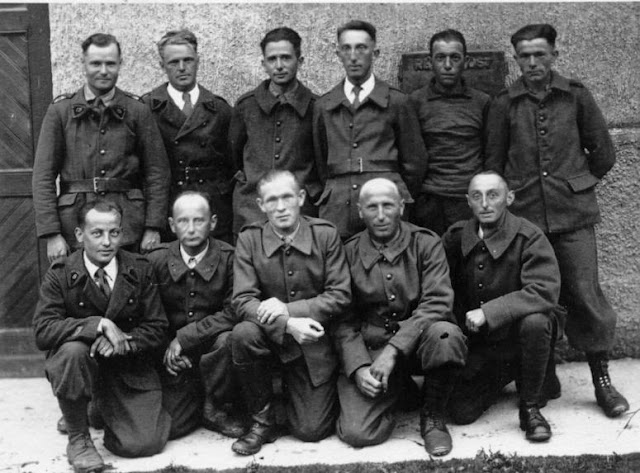La dernière photo prise à Bissingen montre le kommando au grand complet,
10 hommes de troupe, plus mon père qui était sergent-chef.
The Bissingen kommando ended for my father in
October 1941. He had lived for more than a year with these ten comrades and it
was difficult for him to leave them. Prisoners created habits that also allowed
them to structure their lives, which had been destroyed by war and the distance
from loved ones. Living in Compiègne, my mother made many attempts to have my
father repatriated to France, as Hitler had promised for all the Compiégnois
prisoners when the armistice was signed near Rethondes, and my father
multiplied the steps, but it took them a long time for this promise to be kept,
because of course no officer had any order to release the Compiégnois
prisoners. Despite the French newspapers that wrote it in black and white and
that my mother cut out to send to my father, the officers who were read by him
said: "You must not believe what the newspapers write", or "we
have not received any order on this subject". My mother even had the nerve
to go to the Kommandantur de Paris, located at the corner of rue du 4-Septembre
and avenue de l'Opéra, to ask for my father's release. She only remembers the
steel blue eyes of the officer who turned her away dryly with disdain. Her
youth, combined with the desire to see my father again, with whom she had only
lived with for 9 months before he was mobilized, and her incredible
determination to do only what she had decided to do, were the source of her
reckless approach. When she recalled this episode many years later, remembering
that morgue-filled officer staring at her with his cold eyes and telling her
that there was no good reason for my father to be released, she could not help
but conclude: "What a bastard!
The last picture taken in
Bissingen shows the entire kommando, 10 troopers, plus my father who was chief
sergeant.  |
| Kommando de Bissingen stalag VA 1941 |
 |
| Kommandantur de Paris |



Aucun commentaire:
Enregistrer un commentaire
Si vous désirez la version numérique du livre Stalag VA merci de laisser votre adresse mail à: b.dusehu.becker@gmail.com
Als u de digitale versie van het boek Stalag VA wilt ontvangen, kunt u uw emailadres achterlaten op: b.dusehu.becker@gmail.com
If you would like the digital version of the book Stalag VA please leave your email address at: b.dusehu.becker@gmail.com